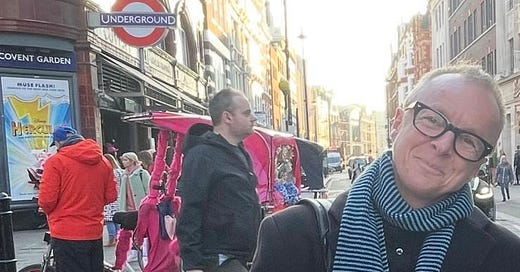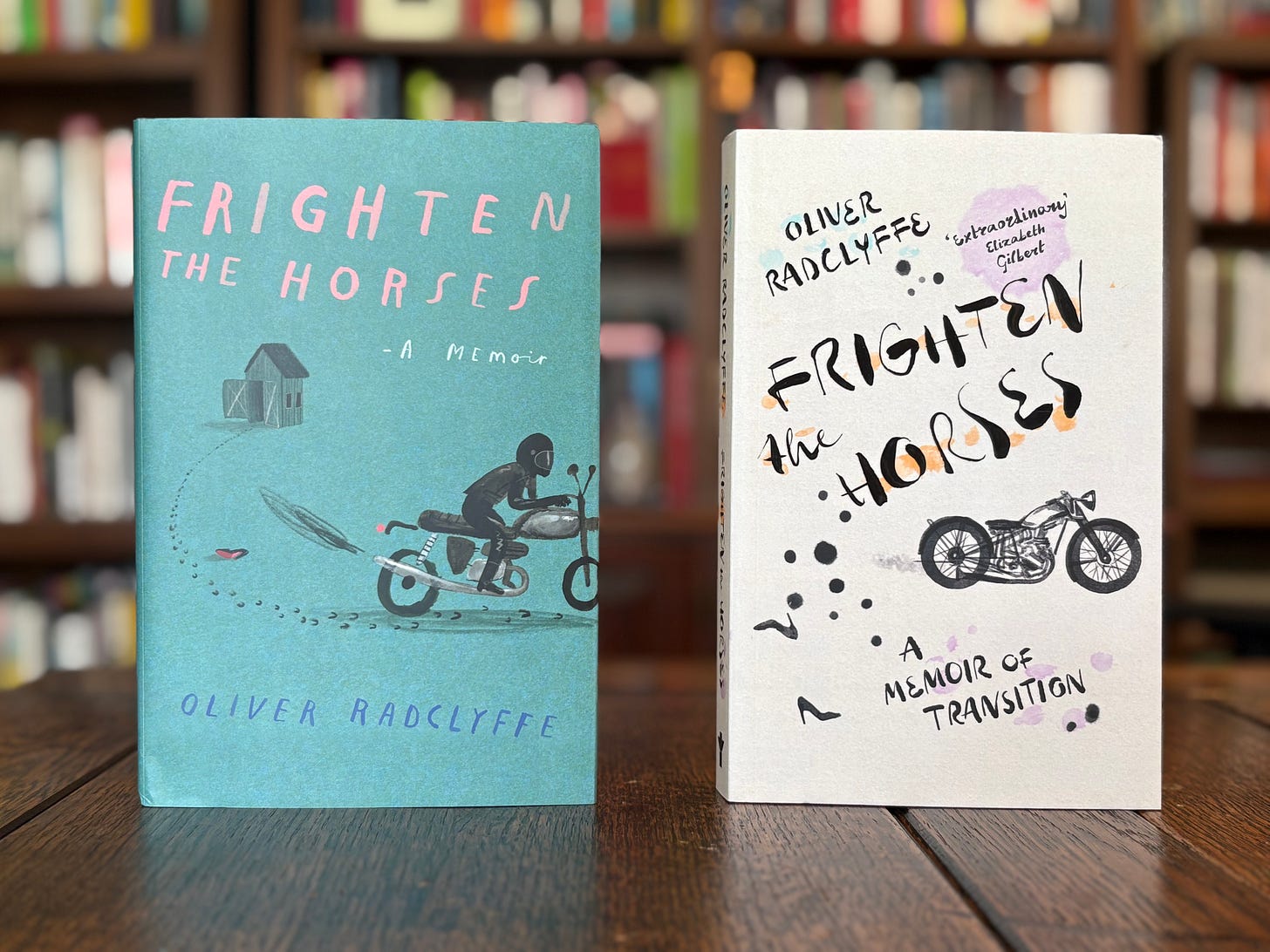A couple of years ago I had lunch with an old school friend, Wendell Steavenson, who has spent her life working as a foreign correspondent. Over the last few decades she’s covered the Iraq War, the Egyptian revolution, the Paris bombings and, most recently, the war in Ukraine. Two things in particular she said during that lunch keep coming back to me. She’d been trying to explain to me the sense that in Tahrir Square, during the first few days of the Arab Spring, nobody knew what was going on. Our current narrative of the Egyptian revolution wasn’t written until long after the events had played out - at the time it was all just whispers and rumors and bits of information amid a general sense of confusion. People had some idea that something was happening, but nobody knew exactly what it was, or what it would become.
I’m writing this on the flight back from the Tucson Book Festival in Arizona, where I spent a lot of time talking with other writers about our current political situation. Everyone seemed to be suspended in this same state of uncertainty. What exactly is this? How much danger are we in? Where is it going to go? What are people going to do? What will historians say about this time when they look back on it? How bad is this story going to get?
You’ve probably all seen Jane Fonda’s speech at the SAG awards, where she used her platform to speak directly to our current situation. “Have any of you ever watched a documentary of one of the great social movements, like apartheid or our civil rights movement or Stonewall, and asked yourself, would you have been brave enough to walk the bridge?” she asked. “Would you have been able to take the hoses and the batons and the dogs? We don’t have to wonder anymore because we are in our documentary moment. This is it. And it’s not a rehearsal.”
Fonda’s call to action reminds me of the second thing Wendell said to me over lunch, which is that when she hears of an event that might lead to some kind of political upheaval anywhere in the world, she is beset by an urgent desire to fly directly into the center of the storm. It’s this overwhelming need to be at the heart of the action that’s been the driving force behind her peripatetic and somewhat dangerous lifestyle - one that seems to have chosen her more than she chose it.
Now I understand this feeling on a visceral level. I just spent a week in England promoting the UK edition of my book, which I was expecting to enjoy as a brief respite, but instead I felt the opposite: the overwhelming urge to get back to the US. This is my home now; it’s where my kids are, my friends are, and where—despite the fact that I’m now living in a daily state of hyper-vigilance—my heart is. I recently heard that Rosie O’Donnell has moved back to Ireland to protect her kid, and I don’t blame her—mama bear’s gonna mama bear—but my desire to stay here in the US doesn’t come from a place of moral obligation towards my community, it comes from somewhere different, a place I think Wendell would recognize. Halfway through my memoir, Frighten the Horses, I tried to explain to my mother why I didn’t want to live in an ivory tower any longer. “It’s beautiful, but isolating,” I told her. “I don’t want to be protected from the world anymore, I want to be part of it.” It’s only now that I understand how deep that feeling runs.
And yet my parents are getting older, and I want to be able to visit them while I still can, but I’ve just had to cancel my plans to fly out to see them with the kids this summer because it no longer feels safe for me to travel outside the country. I didn’t know when I wrote the essay Passport Angels last December—when I thought that getting my gender marker updated would protect me—that the Trump administration would go to such lengths to make sure trans people never felt safe again. I read Project 2025 three years ago when it started doing the rounds on trans social media, so I knew the Trump administration would be coming for trans people, but I assumed that if my passport matched my appearance, I’d be safe coming through passport control. If I pass as a man, and my gender marker says male, why would anyone think I was trans? What I hadn’t anticipated was that I might end up on a government list that would out me as trans regardless.
I’m an American citizen, so I’m less at risk than those who are undocumented or who are here on visas, but I’m also part of a minority group that Trump is actively trying to expel from the country. Up until a couple of weeks ago I wouldn’t have considered myself at risk at all, but during this latest visit to England I woke up one morning to the news that yet another protection has been lifted from the trans community. A report in Bloomberg stated that the Department of Homeland Security has removed provisions which protect trans people from surveillance based on gender identity. This means that while government personnel are prohibited from engaging in intelligence activities based solely on an individual’s race, ethnicity, sex, religion, country of birth, nationality, or disability, they are now at liberty to conduct surveillance based on sexual orientation or gender identity.
Because I’m publicly out as a trans writer, if the government is making a list of targetable trans people, eventually I’m going to end up on it. Which means that if I leave the country I could be flagged at passport control. The government website currently says that my passport is still valid, despite not reflecting my gender assigned at birth, but I no longer trust the government not to change their mind at a moment’s notice. While I’m out of the country, a new executive order could be signed saying that my passport is now fraudulent, and they could refuse me re-entry. I don’t know if this would happen, I just worry that it could.
If it does, the government won’t care that I’m the sole custodial parent to four children, two of whom are not yet old enough to raise themselves if I can’t get back into the country, added to which I might have problems finding an attorney willing to represent me, since the Trump administration is systematically attacking any law firm they consider to be a threat. Even a month ago I would have thought this all sounded paranoid and insane, but this is how trans people live now: in a fog of anxiety, uncertainty and fear.
Still, at least I have the privilege of choice on my side. I can choose not to leave the country for a while, and unless the situation escalates sharply, I won’t be in any immediate danger. But while I’m relatively safe, all over America hundreds of thousands of undocumented immigrants are now afraid of stepping outside of their own front doors. While all eyes are on Mahmoud Khalil and the Venezuelans, how many other less-noticeable people are silently disappearing? My friend Lev spent ten years bearing witness to the Uyghur genocide, so I don’t need to read Octavia Butler or Paul Lynch to understand how this happens. I do recommend reading Paul Lynch’s Prophet Song, however, if you’re struggling to comprehend how it would feel if it happened to you, or, more importantly, if you’re struggling to believe that it ever could.
Finally, I’m aware that the more I write about all this, the more of a target I make myself, but it’s too late to put this horse back in the stable, even if I wanted to, which I don’t. As my new friend Zoe Bossier said during our panel at the Tucson Book Festival, if they wanted us to stay quiet, they chose the wrong minority group. I can only hope that if enough people continue to resist, speak up and act out, things will eventually change. But at what cost in the meantime, I just don’t know.
Love, Oliver
I’d like to keep these posts free for everyone, but if you’d like to support my work as a writer, please consider upgrading to a paid membership, or buy a copy of my memoir, FRIGHTEN THE HORSES—an Oprah Daily Best Book of Fall—which is out now with Roxane Gay Books in the US and Grove Press in the UK. A valuable alternative narrative to the loss and pain that queer history has too often insisted on — New York Times; Humorous and heartwarming — LA Review of Books; It’s the voice that makes this memoir stand out. This is a writer who can capture any moment with a dazzling, insightful, at times musical phrase — Oprah Daily; This book is sharp as razors, but it also pulses with a passionate, desperate, human urgency for truth and liberation — Elizabeth Gilbert; The finest literary telling of the experience of gender transition that I’ve ever read — Kate Bornstein.






I just ordered your book after reading the sample which I loved.
Thank you for writing this Oliver. For you, and anyone else reading this, I strongly suggest getting a Real ID before the enforcement period begins in early May. As a trans woman with a passport in my correct name and gender good through 2034, I no longer trust that it will be accepted as legal ID by the Federal Government. I’m in Illinois and just yesterday I took the weird step of taking the Real ID off my driver’s license and applying for a new state ID card with Real ID. This should extend my legal ID with Real ID for an extra two years, into November 2029. This will likely get me flagged by homeland security, but I was likely already on that list anyway.